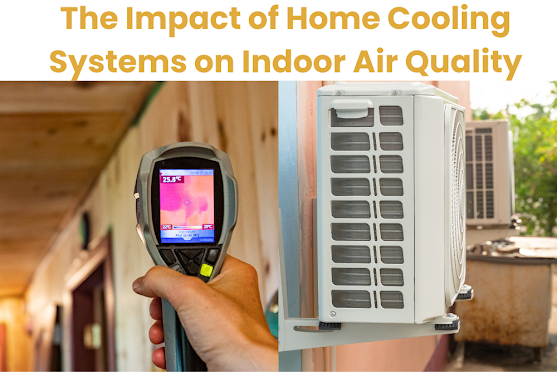Home cooling systems, such as air conditioners, can positively and negatively impact indoor air quality (IAQ). The specific effects can depend on several factors, including the type and maintenance of the cooling system, outdoor air quality, and individual circumstances. Here are some key considerations:
1. Filtration
Most modern cooling systems have air filters that help remove particulate matter and pollutants from the indoor air. These filters can capture dust, pollen, pet dander, and airborne pollutants, improving IAQ. Regularly cleaning or replacing the filters is essential to maintain their effectiveness.
2. Humidity Control
Air conditioners can help control indoor humidity levels, which is crucial for maintaining a comfortable and healthy environment. High humidity enhances the growth of mold, mildew, and dust mites, leading to poor IAQ and potential respiratory issues. By dehumidifying the air, cooling systems can help prevent these problems.
3. Outdoor Air Exchange
Some advanced cooling systems incorporate ventilation features that allow fresh outdoor air to enter the indoor space. This exchange helps dilute indoor pollutants and replenish oxygen levels. However, if the outdoor air quality is poor, introducing it into the indoor environment may have a negative impact on IAQ. Filtering outdoor air or using air purifiers can mitigate this issue.
4. Chemical Emissions
Certain cooling systems, such as window air conditioners, portable air conditioners, or older models, may emit volatile organic compounds (VOCs) or other chemicals that can negatively affect IAQ. These emissions are more likely if the cooling system needs to be better maintained or if low-quality materials are used. Ensuring proper ventilation and choosing energy-efficient and environmentally friendly cooling systems is important.
5. Maintenance
Regular maintenance of cooling systems is crucial for optimal IAQ. Dirty or poorly maintained systems can accumulate dust, mold, and other contaminants, which can then be circulated throughout the indoor space. Routine cleaning, inspection, and servicing of the cooling system, including the air ducts, can minimize these issues.
6. Indoor Pollutant Sources
Cooling systems can potentially spread indoor pollutants if they are present in the environment. For example, if there are indoor sources of pollutants like tobacco smoke, volatile chemicals from cleaning products, or allergens from pets, the cooling system can circulate them throughout the space. Addressing and minimizing these pollutant sources is important for improving IAQ.
For optimal indoor air quality when utilizing a residential cooling system, it is advised to:
- Choose energy-efficient and environmentally friendly cooling systems.
- Regularly clean or replace air filters.
- Ensure proper ventilation, especially when introducing outdoor air.
- Control humidity levels to decrease mold and mildew growth.
- Schedule regular maintenance and cleaning of the cooling system.
- Address and minimize indoor pollutant sources.
It's worth noting that the overall impact of a cooling system on IAQ can vary depending on specific circumstances. Consulting with HVAC professionals or indoor air quality specialists can provide more tailored recommendations based on individual needs and considerations.





